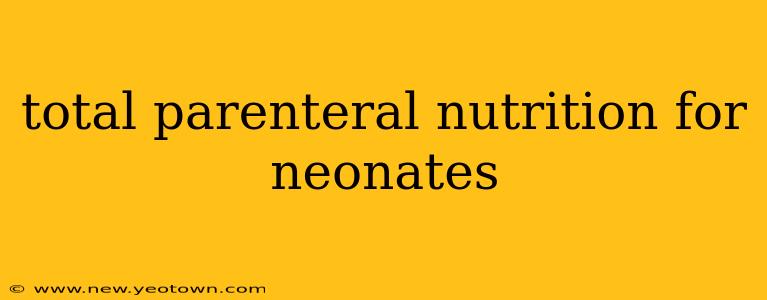The fragile world of neonatal care often necessitates extraordinary measures to ensure survival and healthy development. Total parenteral nutrition (TPN) stands as one of those crucial interventions, offering a lifeline to newborns unable to receive adequate nutrition through the gastrointestinal tract. This comprehensive guide delves into the intricacies of TPN for neonates, exploring its applications, benefits, risks, and the meticulous care required for its successful implementation.
Imagine a tiny infant, born prematurely or with a complex medical condition, unable to feed orally or even digest nutrients normally. Their survival hinges on receiving the precise balance of nutrients intravenously. This is where TPN becomes indispensable, delivering a meticulously formulated solution directly into their bloodstream, bypassing the digestive system altogether.
What is Total Parenteral Nutrition (TPN)?
TPN is a specialized intravenous feeding method that provides complete nutritional support. Unlike peripheral intravenous nutrition (PN), which uses smaller veins, TPN requires a central venous catheter (CVC) to deliver the concentrated nutrient solution. This is because the high glucose concentration in TPN can damage smaller veins. The solution itself is a complex mixture of carbohydrates, proteins (usually amino acids), fats (lipids), electrolytes, vitamins, and trace minerals—all carefully calibrated to meet the unique nutritional needs of the individual neonate.
Why is TPN used in Neonates?
Many reasons necessitate TPN in neonates. These tiny patients often face conditions that prevent them from receiving adequate nutrition through traditional feeding methods. Let's explore some of them:
1. Gastrointestinal Problems:
- Necrotizing enterocolitis (NEC): A severe intestinal disease that requires bowel rest, making TPN essential.
- Short bowel syndrome: A condition where the intestine is too short to absorb sufficient nutrients.
- Intestinal atresia or stenosis: Birth defects that obstruct the intestinal tract.
- Prematurity and immature gut: The digestive system of premature babies is still developing and may not be ready to handle the demands of feeding.
2. Other Medical Conditions Requiring TPN:
- Severe infections: TPN helps support the infant's immune system during periods of severe illness.
- Metabolic disorders: Specific nutrient deficiencies can be addressed through carefully tailored TPN formulations.
- Surgical procedures requiring bowel rest: TPN provides nutritional support during the recovery period.
- Failure to thrive: In cases where a baby is not growing adequately despite attempts at oral feeding, TPN may be necessary.
What are the Benefits of TPN for Neonates?
The primary benefit of TPN is its ability to provide complete nutritional support, preventing malnutrition and promoting growth in infants who cannot feed orally. This, in turn, leads to a variety of positive outcomes:
- Improved growth and development: Adequate nutrition supports optimal growth and maturation of organs and systems.
- Reduced risk of infection: Good nutrition enhances the immune system, helping protect against infections.
- Enhanced wound healing: Essential nutrients are crucial for tissue repair and recovery after surgery or injury.
- Improved organ function: Optimal nutrition supports the normal functioning of all organs.
What are the Risks and Complications of TPN?
While TPN is life-saving, it's not without risks. The potential complications include:
1. Infection:
- Catheter-related bloodstream infections (CRBSIs): A significant concern, requiring meticulous infection control protocols.
- Sepsis: A life-threatening systemic infection.
2. Metabolic Complications:
- Hyperglycemia: Elevated blood sugar levels.
- Hypoglycemia: Low blood sugar levels.
- Electrolyte imbalances: Disturbances in the balance of electrolytes in the body.
- Liver dysfunction: TPN can sometimes stress the liver, leading to abnormalities in liver function tests.
3. Other Complications:
- Thrombosis: Blood clot formation within the vein where the catheter is placed.
- Air embolism: The entry of air into the bloodstream.
- Fluid overload: An excess accumulation of fluids in the body.
How is TPN Administered to Neonates?
TPN administration is a complex process requiring highly skilled and experienced neonatal nurses and physicians. It involves:
- Central Venous Catheter (CVC) Placement: A CVC is carefully inserted into a large vein, typically in the neck, groin, or chest, under sterile conditions.
- TPN Solution Preparation: The TPN solution is prepared in a sterile environment by pharmacists specializing in nutritional support. The precise formulation is based on the individual neonate's needs and closely monitored.
- Continuous Infusion: The TPN solution is usually administered continuously using an infusion pump to ensure a steady supply of nutrients.
- Regular Monitoring: Vital signs, blood glucose levels, electrolytes, and other indicators are closely monitored to detect and manage potential complications.
What Happens After TPN is Discontinued?
Once the neonate's gastrointestinal tract is functioning adequately, the healthcare team gradually transitions them off TPN and onto enteral feeding (feeding via the mouth or tube). This gradual weaning process is carefully managed to prevent complications.
Conclusion
Total parenteral nutrition represents a remarkable advance in neonatal care. It provides a life-saving intervention for infants who are unable to receive nutrition through the gastrointestinal tract. However, its use requires meticulous attention to detail, careful monitoring, and a multidisciplinary approach to ensure the safety and well-being of these vulnerable patients. The benefits are immense, offering a pathway to survival and healthy development for many neonates who would otherwise face significant challenges. It’s a testament to medical advancement and the unwavering commitment to providing the best possible care for the most fragile among us.

